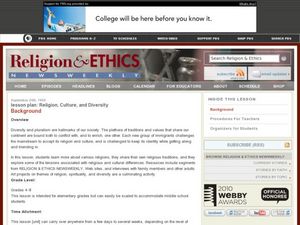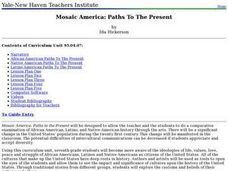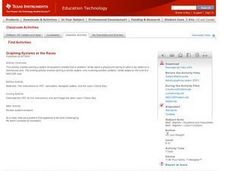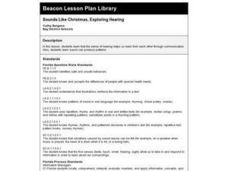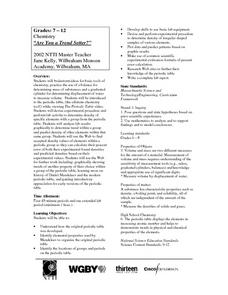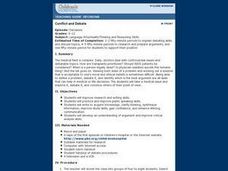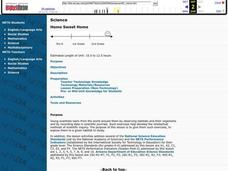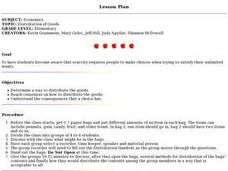Curated OER
"Disco Sucks!"
Young scholars examine why disco and other forms of music were not widely accepted.
Curated OER
Tracking the Monster
High schoolers exchange fake bodily fluids with other students. They track the spread of the "infection" throughout the population of high schoolers and determine where the infection began in the class. Every student in the class...
Curated OER
30-60-90 Right Triangles in Cabri Jr.
Young mathematicians draw and label right triangles using Cabri Jr. technology. They create other special right triangles and identify the length of the hypotenuse and each leg. Students explore the ratios to determine how the hypotenuse...
Curated OER
Religion, Culture, and Diversity
Students study world religions. In this diversity lesson, students interview their grandparents and other older adults about their religious beliefs and traditions. Students research world religions and discuss the diversity of cultural...
Curated OER
Tracking the Monster: Ashley Judd and Indie.Arie Confront AIDS in Africa - Lesson 1
Young scholars gain a better understanding of the AIDS worldwide epidemic. They see how music is connected to other aspects of our lives and our world. They listen to and discuss multicultural music.
Curated OER
Graphing the Annual Food Drive
Students graph the number of items contributed to the food drive. They compare daily results to other days or to an overall goal and answer questions based on the graph.
Curated OER
Hip on Hemingway
Young scholars participate in an official "Hip on Hemingway Club." They explore Hemingway and create a biography of Ernest Hemingway patterned after an alphabet book. They record their "key word" with each of the twenty-six letters of...
Curated OER
Mosaic America: Paths To The Present
Seventh graders study the ideologies of life, values, love, peace and struggle of African Americans, Latinos and Native Americans as citizens of the United States. Authors and artists are used as tools to open the eyes of the students...
National First Ladies' Library
The Debate on Slavery
Young historians research the debate over slavery; some students take the pro-slavery side and others the anti-slavery side. They take the role of a character such as a plantation owner, a legislator, a free Black, a slave, or a northern...
Curated OER
Graphing Systems at the Races
Learners investigate systems of equations as they use the Ti-Navigator to explore scenarios about dog races and NASCAR races. Pupils determine the winner of the race and when opponents pass each other given a speed and distance.
Curated OER
Sounds Like Christmas, Exploring Hearing
Students see that the sense of hearing helps us learn from each other through communication. Also, students explain that sound can produce patterns. They engage in a wide variety of activities that focus on the sense of hearing.
Curated OER
Are You a Trend Setter?
Learners are introduced to the periodic table of elements. They devise and perform and experiment in which they determine the density of specific elements. They use their results to predict the density of other elements in the same group.
Curated OER
Media Literacy: TV - What You Don't See!
Students examine how to evaluate what they are watching on television. They discuss hip hop music videos, compare/contrast them to other types of music videos, write a letter or press release about promoting positive teen stories, and...
Curated OER
Conflict and Debate
Students take a medical issue and explore it, debate it, and convince others of their point of view. They improve research skills and writing skills. Students are able to define a problem, debate it, and identify which is the best...
Curated OER
Comparative Geography I
Students use population density and other statistics to compare countries. They find the population density for the countries listed in the table. Students compare findings with a partner, and then share with the class.
Curated OER
Who am I and Why?
Students make comparisons about themselves and others, which are real and meaningful. They study some basic concepts in the area of genetics and do a complimentary series of experiments, or explorations that illustrate these concepts
Curated OER
We Like to Imagine - Animals
Students describe a pretend animal. They read "The After School Monster." Students read other books and discuss whether or not the characters are real. Students make a drawing of a pretend animal and of a real animal. They make up a...
Curated OER
Home Sweet Home
Students enjoy investigating and becoming aware of the habitats around them. They record their observations in scientific journals. Data collection can take the form of a simple drawing or taking digital photos or videos in the habitats...
Curated OER
Soil pH Effect on Germination of Specific Weeds
Students collect weed seeds from three varieties of weeds (knapweed, thistle, or toadflax, for example they may choose others in addition to the spotted knapweed.) They sterilize soil for thirty containers, plant seeds in sterile soil,...
Curated OER
Growing in Communities, Kids on the Grow
Students participate in an after school program that promotes concern for others, recognizing differences, accepting differences, leadership roles, mentoring, self-responsibility and personal safety. They explore the diversity of their...
Curated OER
Getting to Know You
Students participate in tactile and visual exploration. In this tactile and visual exploration lesson, students listen to John Archambault's, Grandmother's Garden, and sing the song, "Friends Are Like Flowers." They participate in ice...
Curated OER
Distribution of Goods
Students study the concept of scarcity and that it requires people to make choices when trying to satisfy their unlimited wants. Groups are given bags of items and must distribute the items in the bag in a way that is acceptable to...
Curated OER
Cookie Creations
Students, in teams, create and prepare an original cookie recipe. They market their cookie by designing creative packaging and advertising. They compete with other groups in a cookie contest.
Curated OER
Contributions of Immigrants
Young scholars identify the contributions of immigrants to America. They analyze the value of these contributions as well. They discuss how these contributions affect other's personal perspectives of immigrants.





